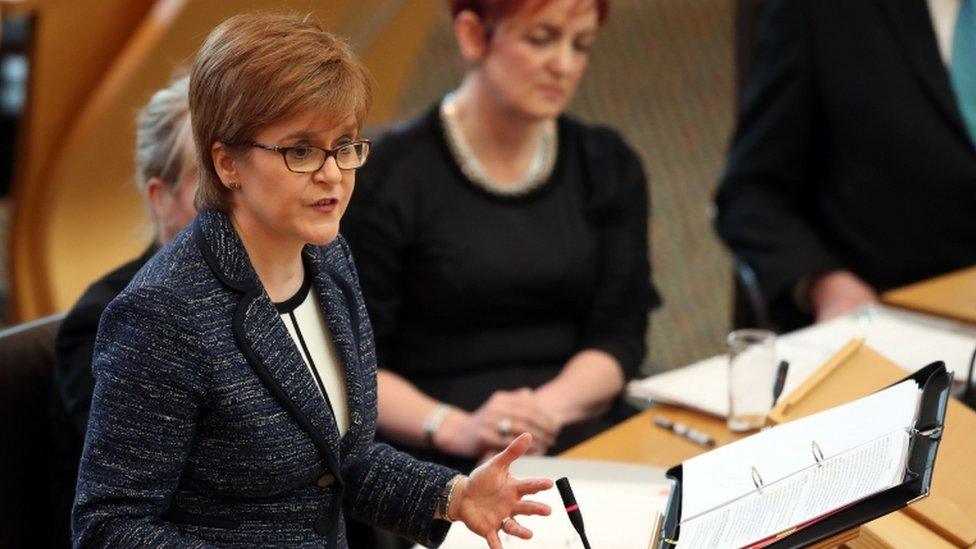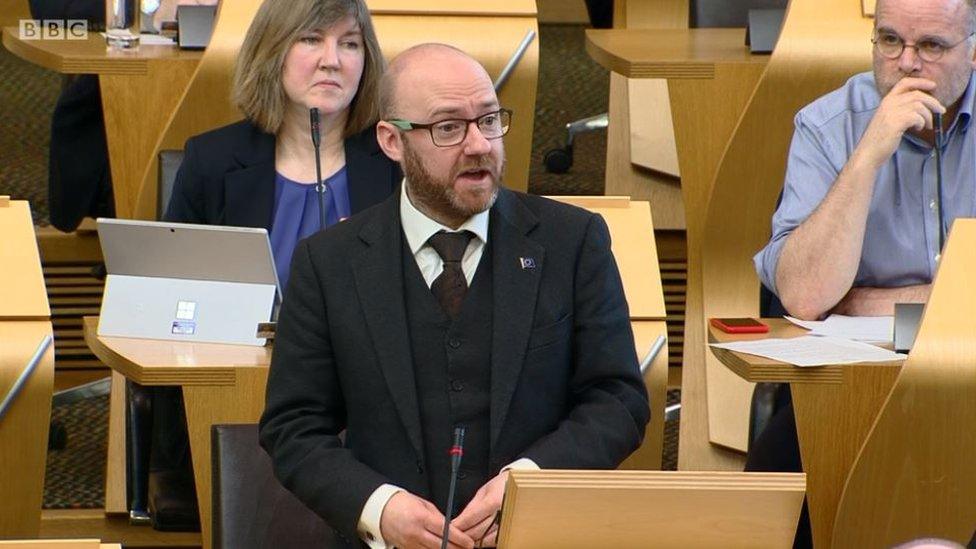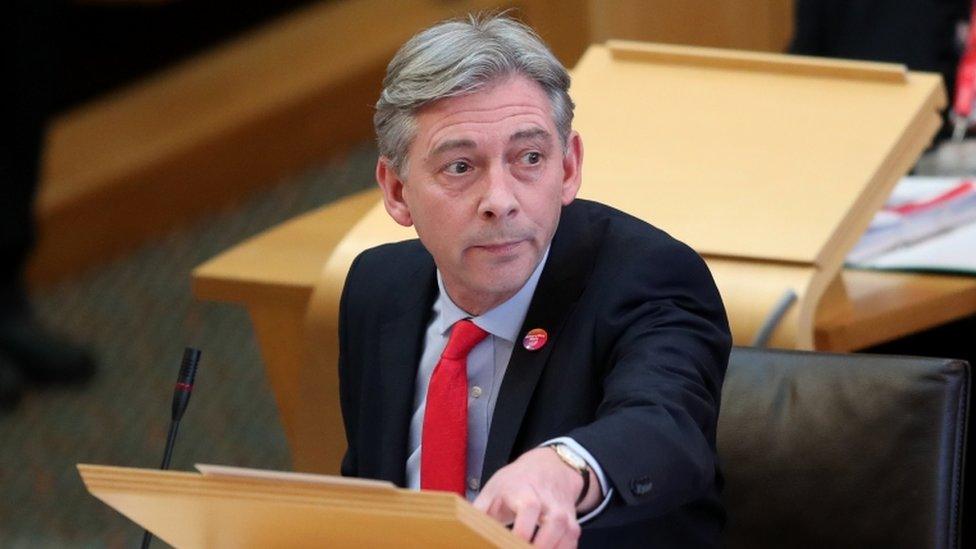Reading between the lines at FMQs
- Published

The American writer Ralph Waldo Emerson noted of an encounter: "The louder he talked of his honour, the faster we counted our spoons."
In broad terms, he was counselling that an individual's intentions may not always be evident from their words, that there may be an alternative interpretation.
Such might be said to apply to today's exchanges at Holyrood. Not, you understand, that I am remotely suggesting that the Parliamentary cutlery is in any danger.
No, my point is simply that, from time to time, an MSP or a minister may seemingly be saying one thing while signalling, through judicious use of tone or context or body language, something different entirely.
Sometimes there are clues on offer from the orator. Such was also the case at Holyrood. Indeed, at one point, Nicola Sturgeon counselled that we should be "reading between the lines" with regard to her statements.
This applied to a number of replies where she stressed that her remarks had to be constrained because of the statutory limits upon her powers.
One such was the issue of sewage treatment in the environs of Gairloch. Labour's Rhoda Grant said she had been "inundated" with complaints about a proposal to vary the nature of treatment across the year.
Ms Sturgeon's words stressed that it had yet to be decided whether the particular planning application would be called in. However, did her tone signal a degree of sympathy?
Was she hinting that she thinks the plan stinks? No, that's going too far. She stayed strictly within the bounds of Ministerial propriety. And yet.

Patrick Harvie raised the closure of the Scottish Youth Theatre
The same principle applies with regard to a question from Patrick Harvie of the Greens anent the Scottish Youth Theatre - who face potential closure because of the absence of regular funding from Creative Scotland.
Mr Harvie made plain his displeasure at the decision, citing test imonials from those who had benefited from SYT's work.
In response, Ms Sturgeon was obliged to note that she could not and would not countermand the decisions taken autonomously by Creative Scotland.
Was there perhaps an unconscious - or conscious - echo there of the controversy which attended claims of a governmental intervention in the work of the Scottish Police Authority?
Ms Sturgeon went further. She stressed that funding decisions in the arts were always tricky. Creative Scotland had a tough job. She understood. She sympathised.
Alternative avenues
But. Without overstepping the mark, she made decidedly clear that she hugely values the work of SYT and would regret any threat to their existence.
So, while voicing comradely compassion for those who are obliged to take tough decisions, she simultaneously signalled that she will do everything in her power, through alternative avenues, to help support the youth theatre.
Earlier, Ms Sturgeon traded stats with Ruth Davidson, she who leads the Scottish Conservatives. Ms Davidson produced a list of figures which indicated that GP services in Scotland were in crisis.
The FM countered those - and then produced other figures which suggested that things were even more challenging in England, under Tory rule.
These were lively exchanges on a valid topic. Yet, somehow, the exchange failed to shift beyond that trade of data. As, presumably, the FM intended.

Richard Leonard aims to take Labour back from third place to government at Holyrood
Richard Leonard's Labour Party is not presently burdened with Westminster power. So that particular problem did not arise for him.
(Ms Sturgeon regularly cites Labour's record in Wales but, as the topic today concerned benefits, largely reserved, that comparator did not run).
The exchanges were substantive and fascinating. Mr Leonard opened by urging the FM to replicate Labour's plan of topping up child benefit in Scotland.
Ms Sturgeon responded cautiously and thoughtfully. The debate, of course, hinged partly on the classic political and philosophical dilemma: are benefits better provided universally or via means-tested targeting?
Universalism, it is said, removes stigma and improves take-up. Exactly such an approach is used by the Scottish Government over the provision of prescriptions without payment. By contrast, it is argued that targeting helps focus scarce resources on those in real, discernible need.
The Labour leader had deftly prefaced his remarks with an excoriating reference to the extent of child poverty in Scotland. This, again, demanded caution from the FM.
She expressed sympathy with the concept of universalism. How could she do other, given her government's record?
But she noted that there were pragmatic objections to the particular top-up suggested by Labour. It was, she noticed, an enhanced Scottish payment on top of an existing universal benefit.
Research had disclosed that such top-up cash would, in seven out of ten cases, go to families who were not in poverty, under the categorisation used. Would that, she questioned, be a sensible use of resources?
Cautious replies
But Mr Leonard - who was having a good day at the despatch box - was not finished. Referring, as others had done, to International Women's Day, Mr Leonard advocated splitting the payment of Universal Credit, with half going as of right to the woman in a partnership.
Otherwise, he argued, one risked the situation where a woman's abuser in a relationship also held the family purse strings, courtesy of the state.
Once again, Ms Sturgeon was exceptionally cautious in her reply. She was interested, she confirmed, in the concept of a cash split. However, it required careful examination, with regard to operation in practice. This she promised to do.
However, just as Mr Leonard had piled pressure upon pressure, Ms Sturgeon had a final word in waiting.
She noted that one of the practical considerations to bear in mind was that UC was not wholly in the control of the Scottish Parliament. Even with the partial devolution of benefits, it was largely in the control of the UK Government.
Ms Sturgeon thus set out a syllogism for the Labour leader - doing so gently and without bombast, in the spirit of the day. If he disliked benefits decisions being taken by the Tories at Westminster, then perhaps he might care to support their transfer to Holyrood.
In all, a powerful exchange with which to herald this weekend's Scottish Labour conference in the great and noble city of Dundee.
- Published8 March 2018
